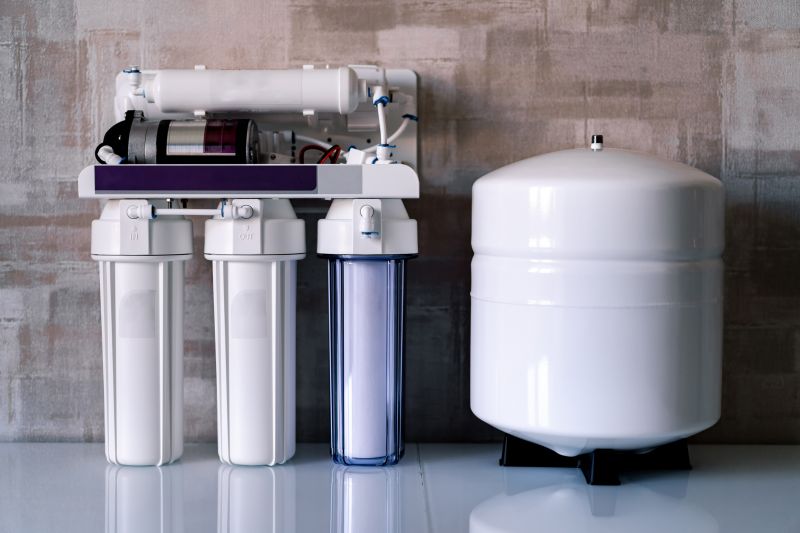Leading Products For Ro System Installations To Simplify Your Setup Process
Identify key components and accessories that make installing your RO system straightforward and efficient.
 Installing a reverse osmosis (RO) system requires a variety of specialized products to ensure optimal performance and longevity. From filtration components to mounting hardware, each part plays a crucial role in maintaining water quality and system efficiency. Proper selection of these products can simplify installation and help in achieving desired water purity levels. When considering components for an RO system, it's important to understand the function of each part and how they work together to produce clean drinking water.
Installing a reverse osmosis (RO) system requires a variety of specialized products to ensure optimal performance and longevity. From filtration components to mounting hardware, each part plays a crucial role in maintaining water quality and system efficiency. Proper selection of these products can simplify installation and help in achieving desired water purity levels. When considering components for an RO system, it's important to understand the function of each part and how they work together to produce clean drinking water.
Top Overall Option
Multi-Stage Reverse Osmosis Filtration System
A multi-stage RO filtration system combines pre-filters, a reverse osmosis membrane, and post-filters to deliver comprehensive water purification. Designed for versatility, these systems often include durable housings, high-quality membranes, and easy-to-install fittings. They are suitable for various water sources and can be customized with additional filters or accessories to meet specific needs.
Types of Products For Ro System Installations
Pre-Filters
Pre-filters remove larger particles and sediments, protecting the membrane and extending system life.
RO Membranes
Core component that performs the reverse osmosis process, filtering out dissolved solids and contaminants.
Post-Filters
Final polishing filters that improve water taste and remove residual odors.
Filter Housings
Enclosures that securely hold various filter cartridges in place.
Tubing and Connectors
Flexible tubing and fittings that connect system components securely and prevent leaks.
Pressure Gauges
Devices that monitor water pressure within the system, aiding in troubleshooting.
Flow Restrictors
Components that regulate water flow through the membrane for optimal filtration.
Shut-Off Valves
Valves that control water flow, allowing for easy system maintenance and repairs.
Storage Tanks
Reservoirs that store filtered water, ensuring supply availability.
Installation Kits
Complete packages with fittings, mounting hardware, and instructions for easy setup.
UV Sterilizers
Optional components for additional disinfection of the purified water.
Leak Detectors
Devices that alert users to leaks, preventing water damage.
Replacement Cartridges
Spare filters for routine maintenance and optimal system performance.
Brackets and Mounting Hardware
Supports and mounts for securing system components in place.
Water Quality Test Kits
Tools to test the purity and quality of water before and after filtration.
Popular Choices
Widely used to remove sediments and chlorine, protecting the main membrane.
Commonly selected for their compatibility and filtration capacity.
Popular for improving water taste and clarity after initial filtration.
Durable housings that accommodate a variety of cartridge sizes.
Complete sets of tubing and fittings for straightforward installation.
Essential for controlling flow rates through the membrane.
Commonly used for easy system shut-down during maintenance.
Popular for storing filtered water for household use.
All-in-one packages for quick and efficient setup.
Increasingly chosen for added disinfection, especially in well water systems.
Frequent additions to prevent water damage from leaks.
Regularly purchased to maintain system performance.
Popular for secure and organized installation in various spaces.
Commonly used to verify water quality post-filtration.
RO system installations typically involve multiple stages, including pre-filtration, the main membrane, post-filtration, and storage. Each stage may require different types of filters, housings, and connectors. Quality fittings and durable tubing are essential for preventing leaks and ensuring a secure connection. Additionally, accessories such as pressure gauges, flow restrictors, and shut-off valves can enhance system control and monitoring.
Choosing the right products also depends on the specific water source, water pressure, and flow rate requirements. Compatibility between components is vital, especially when upgrading or customizing an existing system. Investing in reliable, well-designed parts can reduce maintenance needs and extend the lifespan of the entire RO setup. Whether you are installing a new system or upgrading an existing one, selecting the appropriate products is key to achieving consistent, high-quality water output.
Overall, a comprehensive understanding of the various products involved in RO system installation can help users make informed decisions. While there are many options available, focusing on quality and compatibility ensures a smoother installation process and reliable operation over time. Properly selected products contribute to a safe, efficient, and effective water purification experience, making your investment worthwhile.
Key Buying Considerations
- Compatibility with existing or planned RO system components.
- Water source type and its specific filtration needs.
- Flow rate requirements to meet household or usage demands.
- Filter capacity and lifespan to reduce maintenance frequency.
- Material quality of housings and fittings for durability.
- Ease of installation and available instructions or support.
- Availability of replacement parts and cartridges.
- Space constraints for mounting and storage tanks.
- Additional features like UV sterilization or leak detection.
- System pressure ratings to ensure proper operation.
- Water quality testing options for ongoing monitoring.
- Budget considerations without compromising essential quality.
- Warranty and customer support options.
- Ease of access for routine filter replacements.
- Compatibility with local water conditions and contaminants.
